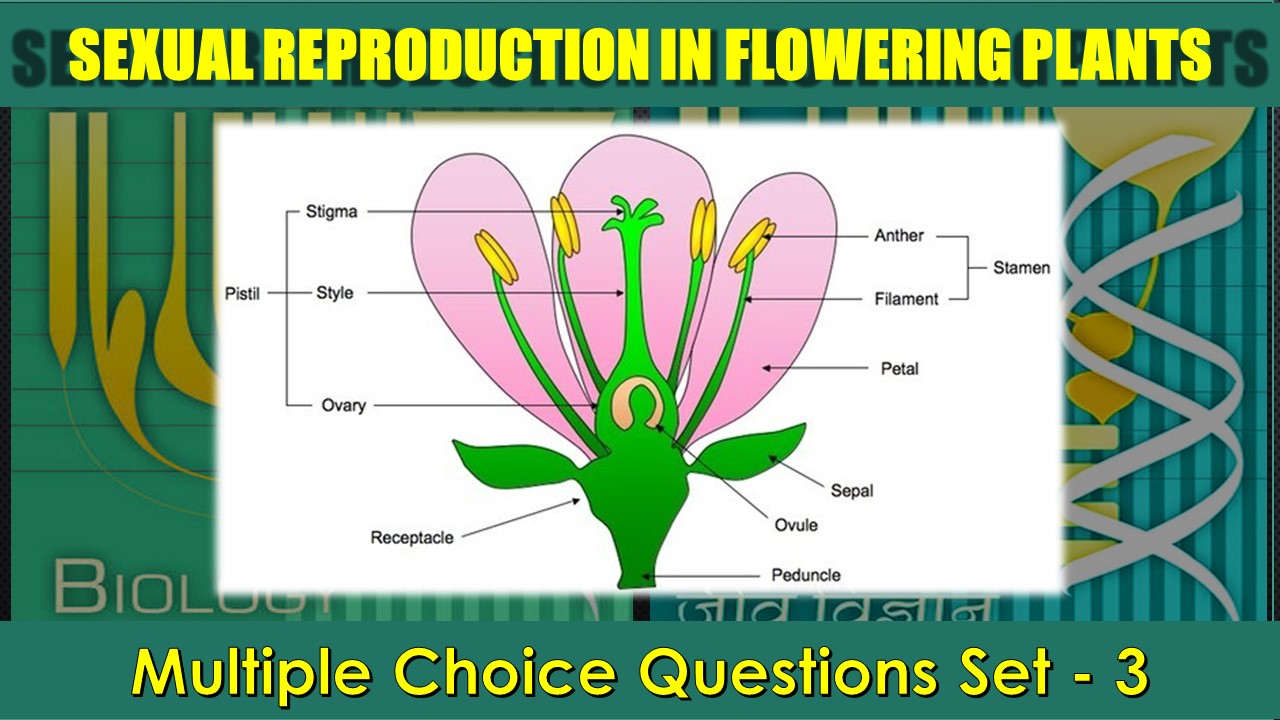CBSE Class 12 Sexual Reproduction in Flowering Plants Multiple Choice Questions with Answers. MCQ Questions Class 12 Sexual Reproduction in Flowering Plants with Answers Is Prepared Based on Latest Exam Pattern. Students can solve NCERT MCQ questions Class 12 Sexual Reproduction in Flowering Plants with Answers to know their preparation level.
Students who are searching for NCERT MCQ Questions Class 12 Sexual Reproduction in Flowering Plants with Answers are compiled here to get good practice on all fundamentals. Know your preparation level on MCQ Questions for Class 12 Sexual Reproduction in Flowering Plants with Answers. You can also verify your answers from the provided MCQ Class 12 Sexual Reproduction in Flowering Plants with Answers. So, ace up your preparation with MCQ of Class 12 Biology Examinations.
MCQ Questions Class 12 Sexual Reproduction in Flowering Plants with Answers - Set - 3
Question 1:
Who proved that the cells are totipotent?
(a) White
(b) Skoog
(c) Miller
(d) Steward
Correct Answer – (D)
Question 2:
All of the following structures are found in angiosperms except ?
(a) Archegonium
(b) Pistil
(c) Anther
(d) Megagametophyte
Correct Answer – (A)
Question 3:
In an ovule meiotic takes place in:
(a) Nucellus
(b) Megaspore mother cell
(c) Megaspore
(d) Archesporium
Correct Answer – (B)
Question 4:
Parthenogenesis is common in :
(a) Grape
(b) Mango
(c) Citrus
(d) Litchi
Correct Answer – (A)
Question 5:
Commonly in a mature fertilized ovule n, 2n, 3n conditions are respectively found in :
(a) Endosperm, nucellus and egg
(b) Egg. antipodals and endosperm
(c) Integuments, synergids and egg
(d) Egg, nucellus and endosperm
Correct Answer – (D)
MCQ Questions Class 12 Sexual Reproduction in Flowering Plants With Answers
Question 6:
Totipotency is
(a) Development of a fruit from a flower in a medium
(b) Development of an organ from a cell in a medium
(c) Development of tissues of all kinds from a cell in a medium
(d) Development of tissues of all kinds from a cell in a medium
Correct Answer – (C)
Question 7:
In Capsella the endosperm in generally:
(a) Haploid
(b) Diploid
(c) Triploid
(d) Tetraploid
Correct Answer – (C)
Question 8:
An orthrotropous ovule is one in which micropyle and chalaza are :
(a) Oblique to funiculus
(b) At right angles to funiculus
(c) In straight line with funiculus
(d) Parallel to funiculus
Correct Answer – (C)
Question 9:
After fertilization ovule develops into:
(a) Integument
(b) Seed
(c) Embryo
(d) Endosperm
Correct Answer – (B)
Question 10:
Normal Embryosac of Angiosperm is :
(a) Unicellular
(b) Bicelled
(c) Penta celled
(d) Seven called
Correct Answer – (A)
- NCERT Solutions Class 11 Chemistry Chapter 1 : Some Basic Concepts of Chemistry
- NCERT Solutions Class 11 Chemistry Chapter 2 : Structure Of The Atom
- NCERT Solutions Class 11 Chemistry Chapter 3 : Classification of Elements and Periodicity in Properties
- NCERT Solutions Class 11 Chemistry Chapter 4 : Chemical Bonding and Molecular Structure
- NCERT Solutions Class 11 Chemistry Chapter 5 : States of Matter
- NCERT Solutions Class 11 Chemistry Chapter 6 : Thermodynamics
- NCERT Solutions Class 11 Chemistry Chapter 7 : Equilibrium
- NCERT Solutions Class 11 Chemistry Chapter 8 : Redox Reactions
- NCERT Solutions Class 11 Chemistry Chapter 9 : Hydrogen
- NCERT Solutions Class 11 Chemistry Chapter 10 : The s-Block Elements
- NCERT Solutions Class 11 Chemistry Chapter 11 : The p-Block Elements
- NCERT Solutions Class 11 Chemistry Chapter 12 : Organic Chemistry: Some Basic Principles and Techniques
- NCERT Solutions Class 11 Chemistry Chapter 13 : Hydrocarbons
- NCERT Solutions Class 11 Chemistry Chapter 14 : Environmental Chemistry




